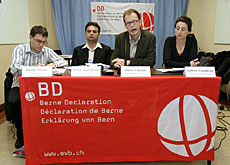UN challenged over business ethics

Four leading non-governmental organisations have urged the United Nations to set binding rules on corporate responsibility, saying existing standards are a "mockery".
The appeal comes as around 1,000 leaders from the worlds of politics, business and civil society gather in Geneva for a two-day summit to review progress on the UN Global Compact.
The voluntary initiative, which was launched seven years ago with a view to raising the bar on human rights, labour, the environment and fighting corruption, has come under increasing fire from NGOs.
At a news conference in Geneva on Wednesday, four of them – the Berne Declaration, Greenpeace, Amnesty International and ActionAid – said the Global Compact lacked credibility because it was not legally binding.
“We have denounced this accord from the very beginning as a fig leaf for its corporate signatories rather than as a sincere commitment,” said Oliver Classen from the Berne Declaration.
The NGOs urged UN Secretary-General Ban Ki-moon, who is hosting the summit, to make compliance compulsory and hold firms to account for breaching the rules.
Speaking at Thursday’s opening, Ban Ki-moon said that while companies were doing well in some areas, there was “much room for advancement” in others, such as respecting human rights in business, applying labour standards and reporting on corruption cases.
“Certainly we have made some progress in implementing the Global Compact’s principles,” he said. “But it is still uneven.”
Among the Swiss firms that have signed up are ABB, Adecco, Credit Suisse, Holcim, Nestlé, Novartis and UBS.
Global standards
Swiss President Micheline Calmy-Rey lent her support to the initiative on Wednesday, describing it as “beneficial” for both the UN and its partners from civil society. She added that businesses had a crucial role to play in realising the objectives of the UN.
But the Berne Declaration said the lack of accountability damaged both the image of the UN and harmed the development of effective international standards for corporate social responsibility.
“At the global level today, there exists no effective protection for workers, consumers or the environment,” said Classen.
Daniel Mittler of Greenpeace International echoed the view that the accord was “simply not delivering”.
“This isn’t about not working constructively with business but about what role the UN should be playing,” he said.
“It should not be organising trips for CEOs to Geneva; it must set standards and make sure they are adhered to.”
Climate change
Mittler added that a new climate initiative set to be launched during the summit was too vague at a time when urgent action on global warming was required.
Amnesty International warned that it would have to reconsider its future participation in the Global Compact unless credible mechanisms were introduced to ensure accountability.
Signatories are expected to regularly disclose information about their business practices and can be removed from the list if they fail to do so.
But Amnesty pointed out that firms could not be delisted for failing to comply with the initiative’s human rights principles.
Georg Kell, the Global Compact’s executive director, admitted last month that firms in the United States had been slow to join because of perceptions that it has no teeth.
But he said progress was now being made – Coca Cola and Microsoft have signed up in the past 12 months.
swissinfo, Adam Beaumont in Geneva
Former UN Secretary-General Kofi Annan challenged business leaders to join the Global Compact at the annual World Economic Forum meeting in Davos in January 1999.
The aim of the initiative is to bring companies together with UN agencies, labour and civil society to support universal environmental and social principles.
Since its official launch on July 26, 2000, the initiative has grown to over 3,800 participants, including over 2,900 businesses in 100 countries around the world.
1. Businesses should support and respect the protection of internationally proclaimed human rights.
2. They should ensure that they are not complicit in human rights abuses.
3. They should uphold the freedom of association and the effective recognition of the right to collective bargaining.
4. They should uphold the elimination of all forms of forced and compulsory labour.
5. They should uphold the effective abolition of child labour.
6. They should eliminate discrimination in respect of employment and occupation.
7. They should support a precautionary approach to environmental challenges.
8. They should undertake initiatives to promote greater environmental responsibility.
9. They should encourage the development and diffusion of environmentally friendly technologies.
10. They should work against corruption in all its forms, including extortion and bribery.

In compliance with the JTI standards
More: SWI swissinfo.ch certified by the Journalism Trust Initiative


You can find an overview of ongoing debates with our journalists here . Please join us!
If you want to start a conversation about a topic raised in this article or want to report factual errors, email us at english@swissinfo.ch.